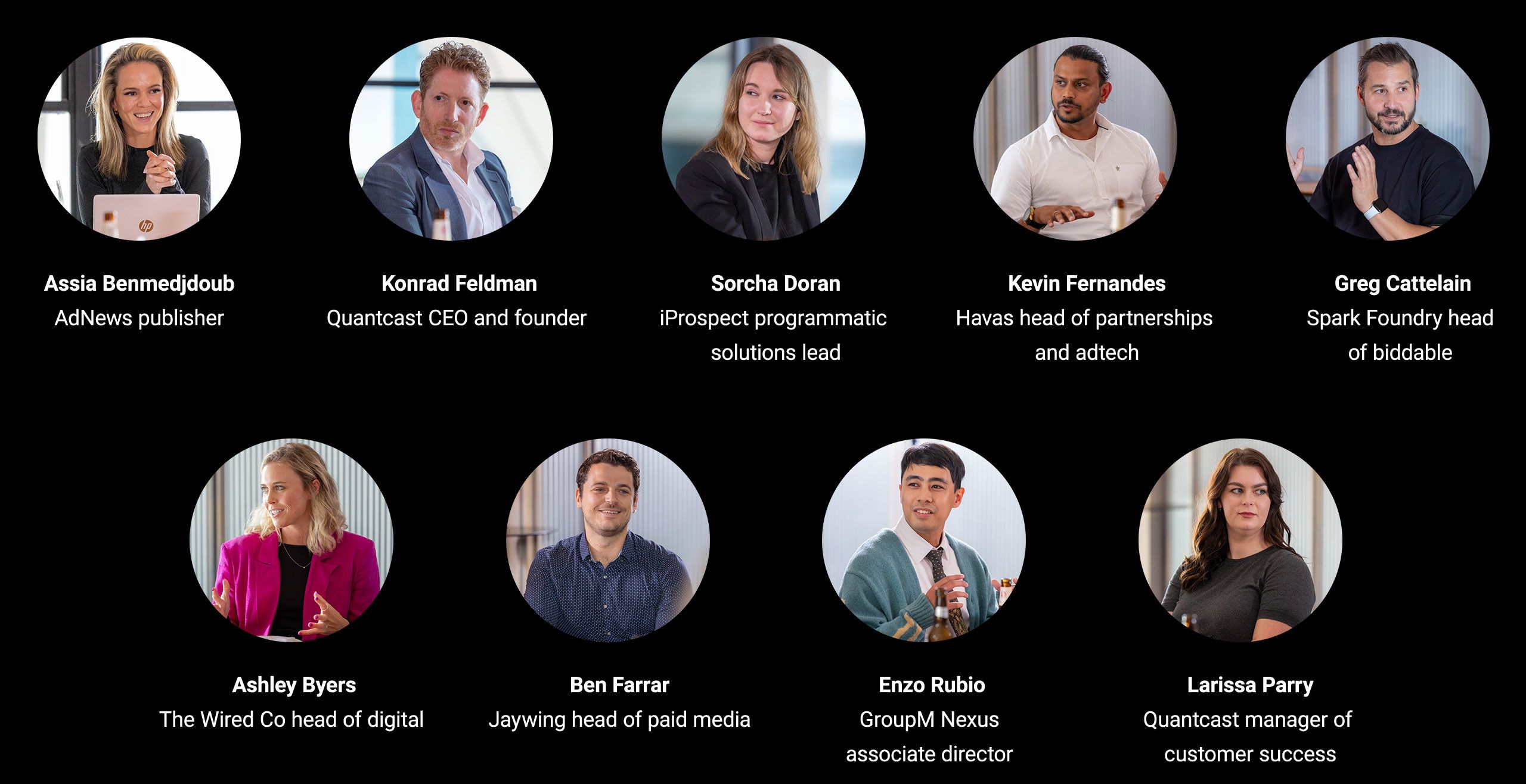
Quantcast & AdNews Present
The cookies conundrum: Where to next?
Google’s decision to delay the deprecation of third-party cookies presents both challenges and opportunities for agencies as they work to mitigate audience data signal loss. In this joint roundtable with Quantcast, industry leaders discuss the future of audience measurement and targeting amid a shifting landscape of delays, alternative solutions and regulatory change.
Joining the discussion is Quantcast CEO and founder Konrad Feldman, iProspect programmatic solutions lead Sorcha Doran, Havas head of partnerships and adtech Kevin Fernandes, Spark Foundry head of biddable Greg Cattelain, The Wired Co head of digital Ashley Byers, Jaywing head of paid media Ben Farrar, GroupM Nexus associate director Enzo Rubio and Quantcast manager of customer success Larissa Parry. The session is moderated by AdNews publisher Assia Benmedjdoub.


Assia: The media industry has been changing its practices since Google first announced plans to deprecate third-party cookies. How will the decision to pause this move for the third time affect the sector?
Greg: Over the last six to eight months, advertisers and agencies have made the deprecation of third-party cookies a number one priority and aligned internally to prepare for the deadline. The industry tends to think of cookies as a marketing problem but we are now talking to people across the entire client business, from privacy and legal teams to technology departments in discussing solutions such as server-to-server tracking. The delay hasn’t changed the plan as we need to double down on a more private internet.
Sorcha: It’s business as usual. We shouldn't be changing our mindset around testing, learning and getting ahead because with the latest delay, we really don’t know how long it's going to last. I also think it’s a shame given all the work that's gone into things like testing API's and Google’s Privacy Sandbox, to delay what’s been suggested in terms of a roadmap.
Ashley: It was probably more a sigh of relief for some people in having added time to develop alternatives. I think it's a chance for us to take advantage of that time and test different ways to get ahead. Having a first-party data approach and making sure that our clients and our advertisers can maintain momentum will set us up for when it actually does happen. I think areas around performance and measurement are going to change. I'm looking at ways to link up our technology within the platforms, but also within our own systems on websites, to make sure that it is accurate data that's coming through. But all of this is not going to be like a final solution. There'll be a lot of iterations of it before we get to the end.
Assia: I remember the performance shockwaves that happened in the iOs14 shakeup. Is this the next turning point?
Ashley: I think everyone can remember that. It rocked a lot of client performance and really emphasised the importance of a robust, first-party data approach. Once that happened, we started talking about having first-party data constantly lead gen, making sure that you've got your CRM system set up to read that data and manage it, but also to feed it back into the ad platforms to target from it. From that point, we also started having conversations around this being the first phase of change in an industry moving to a different future.
Assia: How did you move forward?
Ashley: It was rolling out solutions like server-to-server integrations, say, from Meta’s Conversions API, or CAPI for short. Once we've rolled that out, performance picked up again. So there is a future that you can have all of it talking together and working out to be like accurate data. But it's not in the current forms that we have it that's going to last.
Assia: Larissa, you are nodding your head about those client talking points.
Larissa: Oh yeah. I was at my agency back when that happened. And it was exactly as what Ashley experienced in having those conversations with clients. We’re like: this has been dealt with now and we have a way forward, but it’s just the first phase.
Ashley: I think the server-to-server side of things is going to be a big push because that's where everything can just be in the data and it's really clean. But I would say not everyone's going to be able to have access to that sort of integration and web development, so it might be a bit piecemealed.
Assia: In what way is access limited?
Ashley: I'm thinking more in the space of small brands and small advertisers, they may not actually be able to have the resources or the capabilities of building out that solution. So that's where I think, people like us and industry bodies will need to be able to find a solution that's a bit more accessible to all sides, instead of just some brands and businesses.


2025
The year Google has announced it will delay the sunsetting of third-party cookies to for the third time.

Assia: Ben, why do you think Google delayed the cookie deprecation?
Ben: Google has been pushing really hard for enhanced conversions, or EC. Similar to what you're saying, it is hard for some businesses to set this up. The promise of this solution is that you match the business sale email with the logged-in user. But that's a simple way of describing a lot of technical implementations and challenges, especially for larger businesses and finance businesses. It's really hard to get this additional tracking involved that will enable enhanced conversions. So they didn't get the uptake they needed years ago - they needed it a year ago to get this to roll out properly. This is, in my opinion, why they didn't roll out, and this is why I think it's not going to be in 2025 either because it's not a simple solution.
Ashley: Yeah, I don't think they'll be able to pull it off.

Assia: There are also competition concerns, which was the catalyst for UK regulators placing a hold on the deprecation of third-party cookies this year and kicking this all off. Konrad, what’s your take on that?
Konrad: Regulators want to make sure that whatever is set up doesn't create excessive advantage for Google relative to others. I don't know that Google's necessarily worried about the impact on that piece of this business. Because if all other advertising gets harder to buy, more money goes to YouTube and search, and they have high margins there. The question is: does it really matter? Because while Google has only deprecated 1% of third-party cookies in Chrome, a significant portion of people turn off cookies, use ad blockers or VPN. Then you've got Safari and Firefox that don't really have any third-party cookies already. In the US where I'm based, more than half of the audience that advertisers want to reach cannot be measured or addressed with third party cookies already.
Assia: Why do you think the industry is so on edge about this change?
Konrad: I think there's two ways of looking at it. One is like any change, any new technology, any transition, there's different rates of adoption. It might vary country by country but I think it's much more down to the individual companies if they’re an early adopter. Just over half of all the advertisers we work with run cookieless campaigns today. There's a big spectrum there. Some of them are testing and others have gone past thinking how much budget can I effectively deploy to get scale? Half of the audience is not addressed by cookies and for many advertisers, that's the most desirable part of the audience. It's an opportunity to scale and take advantage. At the same time, while third-party cookies are around, you are able to compare and contrast the solutions that you do have. In terms of really understanding how these solutions work, for synchronisation of first-party data and so on, in many cases you won't know until third-party cookies go away. Because actually, for all the talk, many of these techniques under the cover might still be dependent on third-party cookies.

Assia: Do any agencies here have insights or case studies they can share around that 1% deprecation of third-party cookies in Chrome this year?
Ben: Across our clients, we didn’t notice it.
Kevin: I think I’d just add that probably it's the lack of adoption. That's the big challenge as well. There are probably solutions out there, like contextual relevancy and identity that are thrown around, once cookies fade away. But it doesn't just depend on brands and brand budget, it depends upon publishers having technology in place to actually sync supply and demand. I think as a market, we are very resistant to change. If you drop back in memory on ads.txt, it took a while for it to be adopted. There are things that everyone likes to be second in market for but no one wants to lead. I mean, let's face it, we've been having these conversations on walls for like four years. How far away are we from cookies fading? Unless we actually know that there is a foolproof solution that exists, only then will you probably see that 1% go to 50% in a way that we can measure success. And measurement is an altogether different ballgame in terms of what is success. Because, with everything digital, we just all analyse and overcomplicate it, because we all love data. But too much data is not a good thing as well.
Assia: What marketers are ahead in that journey?
Kevin: Ones that collect CRM, email addresses and hashed data. With the Channel Nine’s of the industry actually collecting local data, you've got this interface now or larger pool that you can actually start targeting. But again, from a brand point of view, when we are talking about first-party data it’s super hard to collect if you are a brand that doesn’t have an eComm presence. Like, what am I collecting? I need to start running content, I need to start running some newsletters to actually collect my first-party data.
Assia: You mentioned some brands being ahead of the journey compared to others - are there specific sectors that are ahead of others?
Kevin: I work with a brand in the FMCG space. They don’t have an eComm presence, you have to go to Coles or Woollies to buy them. They partnered to trial alternate solutions. Of course, we’ve got contextual relevancy and everything that goes with that, but we actually trialled a couple of identity solutions to see what reach they’re getting in browsers such as Safari and Firefox. I think the industry needs to make noise about trialling alternate solutions and sharing of that information. If you don't get everyone singing together, we'll be here and three years from now going, yep, we've gone to 5% of cookies that are deprecated.


Ashley: I think the biggest point people get nervous about is when there are changes to privacy and data protection, along with the removal of cookies, how are you going to reach these users in future? If you're not able to reach them, the cost of media goes up and the dollar doesn't go as far.

Konrad: As that cost of acquisition goes up, people will look at certain channels where maybe the deprecation of third-party cookies has less of an impact. The bigger picture on that is something the industry as a whole should care about. Because if you're a publisher today, Safari users are worth a lot less than cookied Chrome users. Just think about the way people apply data and not just how they apply data and addressability; if you can't measure success, how do you value it? If we think about most of the content that we consume, people are paying to consume it. It’s paid for by advertising. Publishers have had a tough time these last few years and the whole industry needs to move towards supporting an open internet. That choice is important. I don’t think any of us want all our access to content be controlled by tiny number of trillion-dollar companies.

Ashley: When the iOS changes happened, we actually moved budget to places that were performing because we still needed to hit the targets. You’ve got one set budget for the month, and if there's a certain area of the media that's not performing, you have to pivot and move to where it's still going to help fill the gap. And I imagine that with the third-party cookies depreciating, we are going to probably see a shift into platforms that are less impacted by the impacts of cookies. But at the same time, not all of the budget can go to certain areas and Google/Meta are still a big chunk of the pie.

Ben: Is this the master plan? Because ultimately, the Google platforms are not really going to be impacted. You can still run paid search. A huge portion of their revenue comes from there. YouTube. They’re going to be less impacted by cookies deprecated than publishers and other advertisers as well. Clients care about driving results and a lot of what we do is within Google and Facebook, so we’re not going to be seeing a drop from there. We've been very proactive with our clients about solutions to enhance their data. We've spoken a lot about making sure that you have lead gen campaigns to be able to match emails with performance and conversions. So we're pushing and being proactive and getting ahead of the curve with some of the work we're doing in our data team and trying to figure out a way to piece it all together.

Enzo: Data is kind of like a currency, right? They've been the biggest player in the market for way too long. And if you like, personally, they've gotten a bit complacent. Not just with the services, but with the tech. So I love that all of this is happening. Hopefully, it pushes them to innovate more. And it also gives multiple chances for smaller players, maybe mostly tech specific companies, to have a go and see what they can do.

120+
Industry consortiums and companies have proposed new solutions to solve for the loss of third-party data signals that digital advertising strategies have relied on.

Assia: One of the big issues around the removal of third-party cookies goes back to measurement and addressability. How is the industry navigating this, Greg?
Greg: Our reliance on cookie-based measurements has led to a complacency in exploring alternative methodologies. It’s evident that there are existing solutions for measurement that have not been fully embraced due to a lack of understanding or awareness. It is imperative for both our industry and our clients to recognise the potential of these alternative measurement methods and actively work towards incorporating them into our strategies.
Assia: What are some options?
Greg: One option is sample-based measurements, where a large group of fully tracked individuals serves as a representative sample for extrapolating results across an entire campaign or activity. This method offers a level of accuracy that is often used in other channels like TV but digital is often be held to the standard of “measure every individual” because we could. But this time is over and it’s an opportunity to rethink how we measure in digital. Geo-lift measurement can also be an interesting solution to explore in some case. When testing a new channel and its impact on business outcome. The utilisation of AI to generate model-driven campaign result could also be a powerful tool. By leveraging log-in data and extrapolating findings to unlogged individuals, we can tap into a wealth of valuable insights that are currently being overlooked.

Konrad: I think that you're spot on in terms of the measurement piece. When you want to evaluate any solutions – efficacy in terms of replacing third-party cookies - many of the measurement approaches were based on third-party cookies and still are. So you have to find alternatives. When we started developing our cookieless solution, which was after Apple announced that they were going to move on third-party cookies, the first thing we did before we got to any of our activation solutions was measurement. Our solutions are often based on using machine learning to optimise towards an outcome. And machine learning operates off of goals. So you need a way of specifying the goal and that is not going to be based on attribution with third-party cookies. You've got to develop other mechanisms. The third-party cookie has been used for everything because it's ubiquitous, it's part of the HTTP protocol. It’s been used for measurement, it's been used for activation, for personalisation, for attribution, for frequency, for everything. I think our industry hasn't pushed enough for alternatives. So when we have this sort of big change, that's actually an opportunity to do more than just little incremental changes.
Enzo: I came to Australia from the Philippines two years ago. Over there, there’s been a big shift to more quality-based metrics, attention scores, brand safety. I feel like once the cookie deprecation happens here, there's going to be more importance given towards these metrics. I'm seeing a lot of our clients are starting to inquire more about brand safety, trying to avoid ad fraud, trying to increase their attention scores.


Assia: How ubiquitous is it? If you had to put a percentage on third-party cookie impacts on digital spend.
Ashley: It also impacts attribution as well. So, how effective is the marketing dollar. It's not just budget towards the targeting that is used by third-party cookies. It's almost everything. That's why I think people are so freaked out by it. I'm struggling to put a percentage on it.

Assia: Kevin, have you seen any convincing alternative solutions emerge?
Kevin: We've tried ID5. I'll tell you the stats—it's fascinating. At the moment on publishers, 5% of bid requests that come through have ID 5 pass on their bid request. There's 2% on ID 2.0. From a non-advertising point of view, if I have a brand saying, "Yep, sweet, that’s X identity, awesome" and I go to a publisher or a supply partner and ask if they can get these publishers to pass identity or just identity as a possible solution, no one wants to invest properly at the scale until they see results. Results to a publisher aren't just about a nice ad on their 300 by 250 being read by a user. It's about the income they are getting out of it too. So unless they see continuous and substantial revenue growth with technologies….

Sorcha: I think you're right. It's the scale issue that's made it hard to really determine the success. Because even clients that have their own first party data sets and their CDPs, that have them organised and ready for media, the match rates are difficult sometimes to even find those users elsewhere. And then if they don't have enough data records, again, it's just like another scale issue. So how do we really determine whether that's success or not? It's almost not worth even doing a lot of the time. So that's kind of how we're talking to our clients about it. It's kind of an assessment, right. Okay, great, you have a CDP. How many records do you have? This is where you can put in and we'll kind of assess whether actually, we don't recommend you try it. And that is where we’re at right now. I haven't seen anything that's really coming to the fore to say: yes, this is the solution to all of our problems.

Ben: We're trying to explore some solutions. It's out of my technical knowledge to be able to explain this properly but we're looking at server-side tracking, how can we take the information that we can get in and house it and use that to connect back? Again, there's a lot of steps in between there that I'd have to get our dev team to explain. We're trying to be proactive with our clients to try and figure out a way to do this. But like Sorcha said, we haven't come across a solution that is at the same level as what we're what we have at the moment. It’s really hard to imagine a world without third-party cookies, because it’s always been available to us.

Kevin: Just to finish off on Sorcha’s point. Yes, there is no supply coming through identity. But I think fundamentally, even all platforms have been built on algorithms that are based on cookies. So we all sit here, and we’re all like demand and supply needs to match. But if your bidding algorithm is sort of like, not functioned to create an identity then what's the point? Scale, technicalities, capabilities are a big question.

Enzo: I agree with everyone. If you like, unified IDs, device IDs, emails, I think a lot of people look at them as Band-Aid solutions, they are just trying to circumvent whatever is missing and trying to work with that. There's always going to be concerns with regards to data privacy still and I feel like a lot of people would be against it, against the use of these identifiers for advertising. So I'm also not too knowledgeable with the tech. But I'm excited to see how they're going to come up with a with a solution.

Ashley: I’m fully in agreement. I think what we have right now in device IDs, emails, phone numbers, all of that, it's just a Band-Aid fix. If the trend continues where people want anonymous identity on the internet, those are direct things that show someone's identity. I think that right now, I've not seen a current solution that be a long-term fix, but they're pretty good for right now.

Konrad: You hear lots of different solutions in market. Is it going be contextual, or deterministic identifiers, or first party data, or cleanrooms, or cohorts? Yes. It's going to be all of them. It’s going to be all of them in some combination, in different use cases and will likely change over time based on regulation, consumer behaviour, adoption or all of those factors. It’s very unlikely there'll be a single replacement and it will be probably a little messy for a while, because things will take a while to settle out.

Assia: It’s timely you mention regulation with the Australian government committing to introduce privacy reform this year. How do we navigate that?
Konrad: This is a journey we've all been on worldwide for several years now, back to the introduction of GDPR in 2018. There's the introduction of the laws themselves and then there's the interpretation. So even in Europe, six years later, we’re still working through the case law to really understand how it is to be interpreted. In the US, we've been waiting a long time for federal privacy law and while there’s been some proposed, right now the industry is having difficulty navigating different state laws. I think it's good there's a focus on the choice that consumers should have in terms of how their how their data is collected and how it's used. And I think it's good that there's a focus on the fact that certain types of data are more sensitive than others. But regulations can often have unintended consequences and they can create cost too. These are the things we need to work through and I do think it’s going to take many more years to process its way through.
Greg: We don't have GDPR style laws and implementations here in Australia yet and it’s about time because as a market, we are way behind the US and Europe. But when it comes to protecting consumers, there is a risk of butchering things with a saw instead of a scalpel by fast-tracking laws to August. Marketing makes up 5% of productivity so we shouldn’t undermine the impact on the marketing economy and it’s interesting the government is currently assessing the economic impact. GDPR is the downfall of those small and medium businesses, where you need to invest to comply to this extremely complicated regulation and the fine that comes with it can bankrupt your business.
Kevin: In Australia, getting information has been the biggest challenge with the delays. And like it or not, the likes of Google don't want to give everything away as well. So yes, I completely agree with Greg in the fact that it's needed. But we need to take our time to assess it and we don’t just want to rush it because other countries are doing it and backpedal.

116
The number of recommendations for privacy reform made by the Attorney-General’s Department in 2023. 38 were accepted in full by the Federal Government, with draft legislation expected to be tabled by August 2024.

Assia: Where do you think the local industry is behind?
Kevin: Working in silos. I think we're just concentrating on demand, supply platforms, technology and then separately, like five-fold on measurement. That aspect we severely underplay because we will always go back to the price and costing. If I get a cheaper impression based on identity or a cookie that is not the answer to success, it's how does it relate to my business metric? Until we figure that out with a cookieless solution….

Assia: So measurement?
Kevin: I think there needs to be a whole new body who works on measurement. How do we move away from that last click model? I mean, if we started looking at how many brands still use last click model, six out of 10 I would estimate, with caution. It could be more.
Enzo: I hope this change helps us veer away from using last click attribution. I feel like I've spent close to a decade trying to convince clients to veer away from it and take a new approach.
Ben: We've moved the majority of clients away from last click. I'd say like maybe 10 to 15 are still using it. I don't think there is a model that is perfect. The perfect model is the one you agree with your client. I think that comes with talking about business metrics such as actual revenue as a measure of success - because we're very aware of how some channels will claim whatever they want to claim. Attribution is hard.
Assia: What do you use?
Ben: We use DDA. So data driven attribution is a is a vessel we've got for the majority of clients.
Greg: Which uses cookies.
Assia: Hence the sigh of relief!
Sorcha: Significantly, the majority of our clients are still on last click. We find global clients generally will have a global adoption of the attribution model.
Assia: Has the macroeconomic climate made clients less willing to test new alternatives?
Enzo: We try our best to urge them to go cookieless. I guess I have an example. We have clients that are always running performance campaigns but have this problem of setting unrealistic expectations based on benchmarks that aren’t really benchmarks, I would say. It has always been a challenge and there will always be reservations when it comes to trying something new. When programmatic was in its infancy stage, a lot of people were still kind of hesitant to give it a try, right? I suggested we give Quantcast a go and they’ve been killing it ever since. Specifically for performance campaigns, we’re hoping to get more test budgets to try new things.

Ashley: I would say about 30% of our clients are keen to do testing and we always allocate about a 10% test budget each month.
Greg: I would say 40% of our clients are willing to test especially where they’re in a category with specific targeting. Once you remove all of those sectors that don't have incentive to test, then you have the portion that you're left with, like maybe 40 to 50%.
Konrad: There are certain sectors where you have a lot of short-term online activity that are getting volumes from certain investments. But there's others, take luxury goods advertisers, that skew more towards devices that are cookieless. Or if you're a telco and you're in the business of selling mobile phone plans, you need to be reaching out to people who are on devices that don't support third-party cookies. So there’s some of those areas where it’s a competitive opportunity or competitive disadvantage if you don’t do it.
Kevin: The ambition is always to keep 10% of your media spend towards opportunities to innovate. But there’s still the need to go back to the client with the numbers and have that conversation and it’s getting harder. But it's our job to prioritise, to simplify it and to ensure their bottom line is not hit as well.
Ashley: I agree. Budgets across most clients are relatively flat this year so we have to be really clever. But you do need to evolve and push marketing strategies. As an industry, we need to make sure that we are trying new things and not just sticking with what worked in the past.
This transcript has been edited down for brevity.










